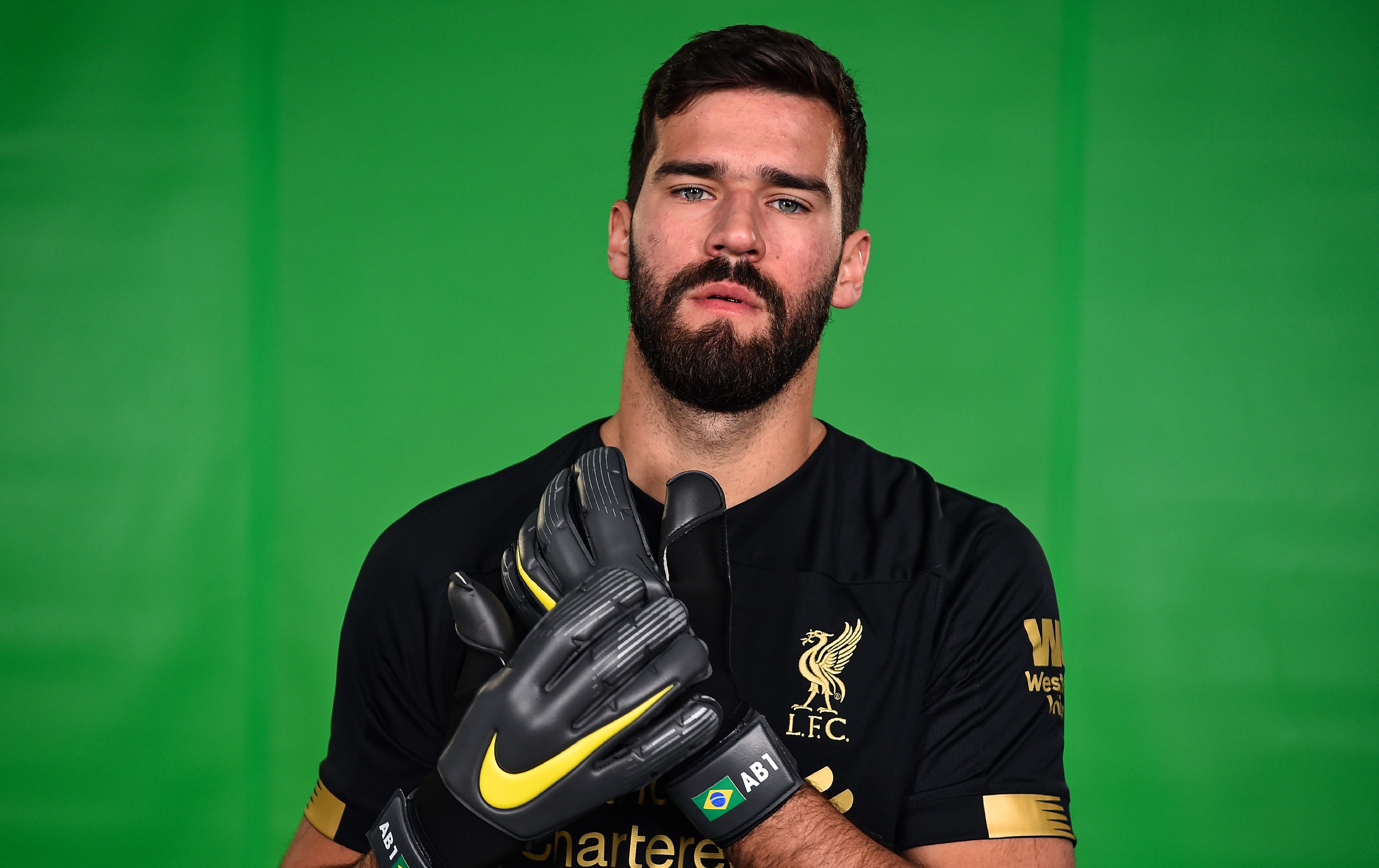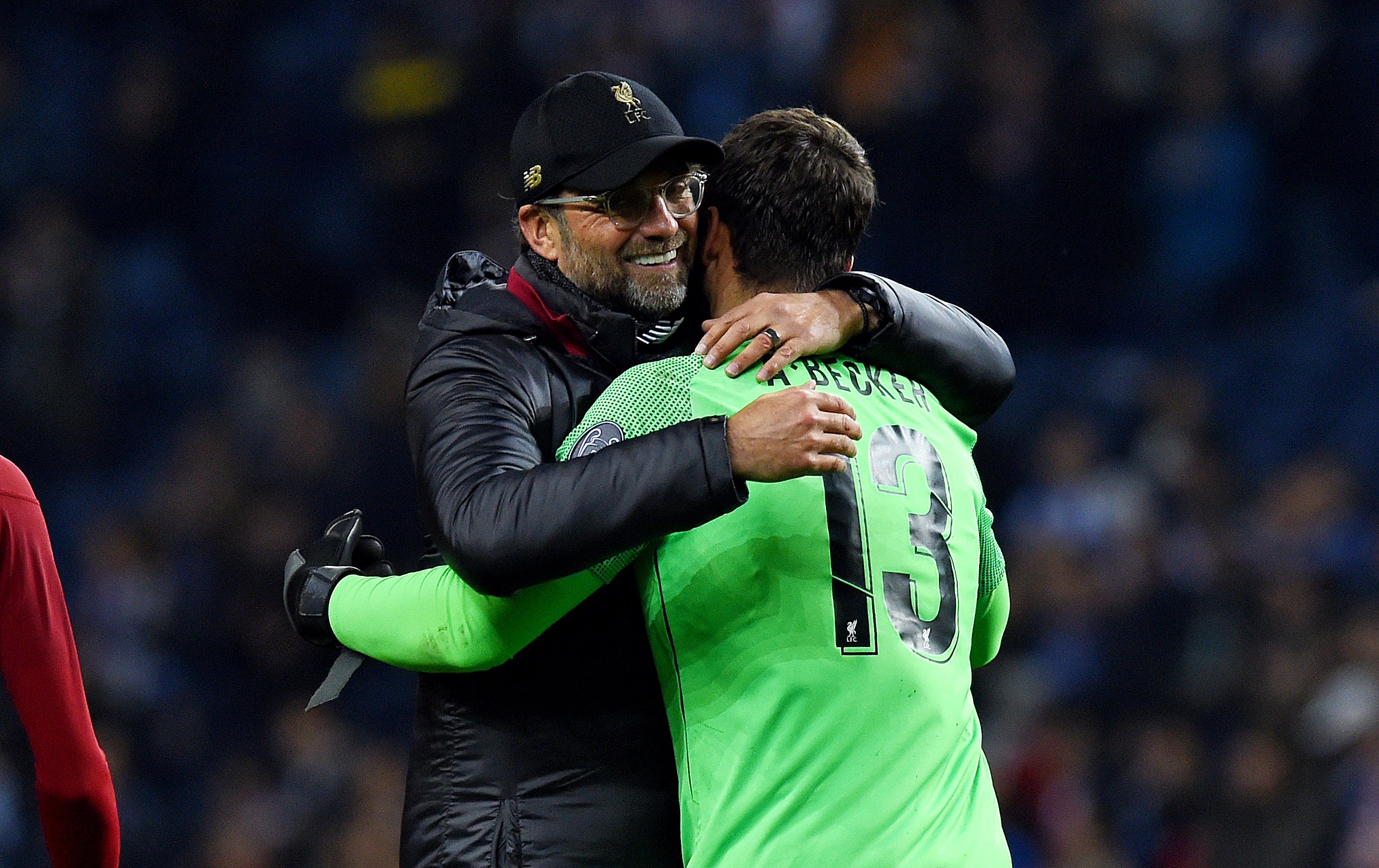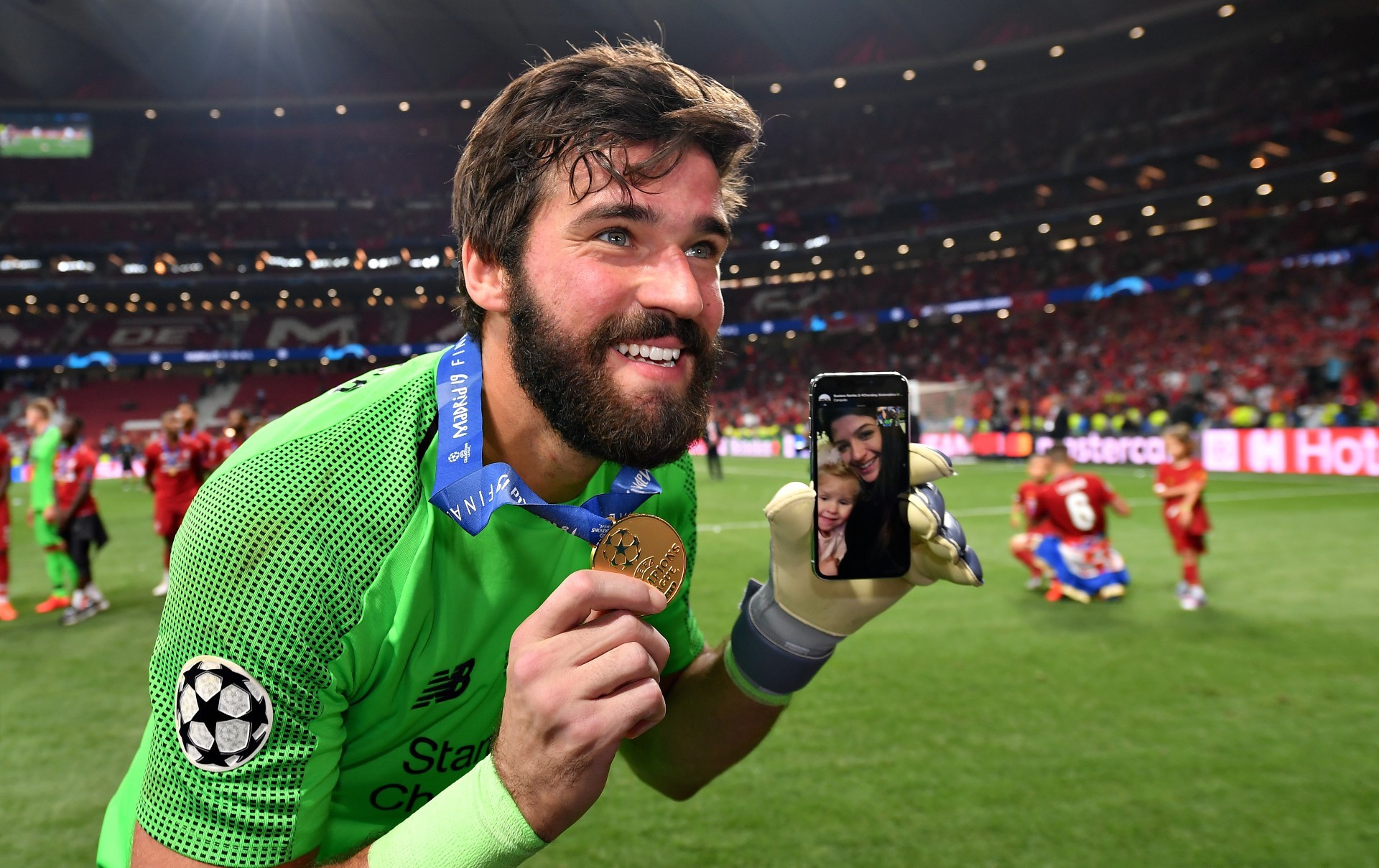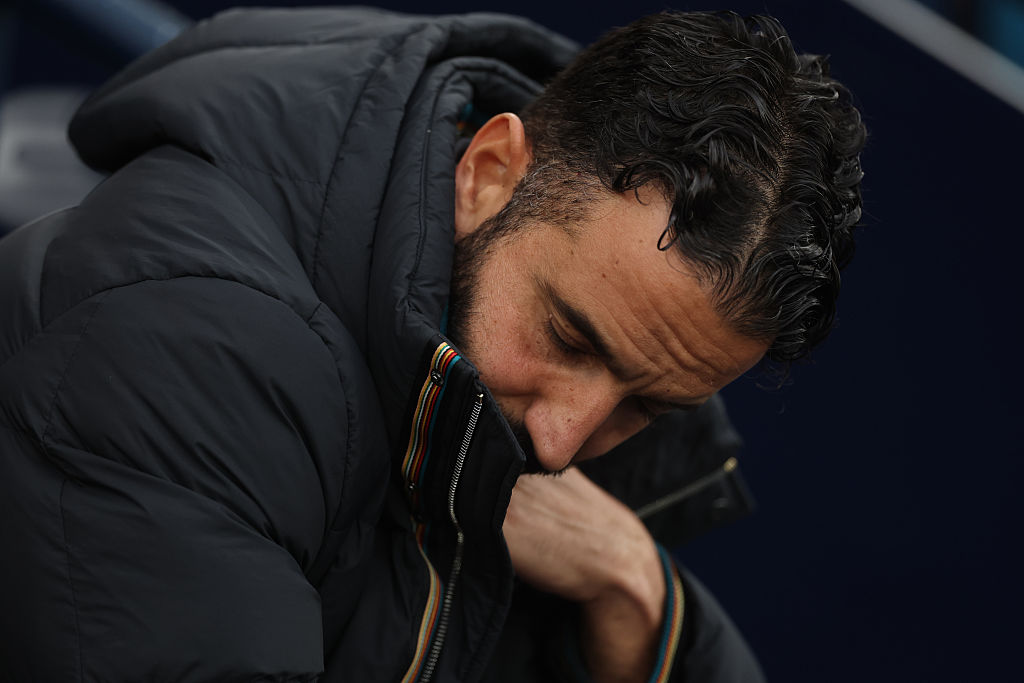Alisson exclusive: “I know the feeling of winning a Champions League final, and I want to feel it again and again” – FFT meets the Liverpool goalkeeper
Liverpool goalkeeper Alisson reveals his goals for this season and how not listening to Jurgen Klopp sometimes pays off

This feature first appeared in the March 2021 issue of FourFourTwo magazine. Subscribe now!
The year is 2021, and you’ve been tasked with creating the perfect goalkeeper. In an ideal world, or if you just happen to be Bonnie Tyler, several attributes leap out at you like the refrain of a song. He’s got to be strong. He’s got to be fast. He’s probably larger than life. You need a hero.
Not one borne of flashy egotism, but the reliable, focused type who always wants to put a shift in for his team-mates. The one who’s able to keep his head when others around him crumble quicker than a block of Caerphilly. Basically, you need Alisson Becker.
Let’s start with his honours: the Champions League, FIFA Club World Cup, UEFA Super Cup and Copa America in 2019, followed by the Premier League title in 2020. Then there are the individual prizes: FIFA Goalkeeper of the Year, Golden Glove gongs domestically and at international level, nominations for the Ballon d’Or and spots in back-to-back FIFPro World11s, alongside accolades from pretty much every major publication on the planet.
Some players simply find themselves in the right place at the right time to lift silverware. Far fewer can consider themselves natural winners who seem destined to gobble glory wherever they go.
FourFourTwo last caught up with Alisson in November 2018, just as Jurgen Klopp’s red machine was marauding towards European domination. “What’s life if not fighting for your dreams?” he pondered then. “I dream of winning the Champions League.” Within six months he had done just that, banishing Liverpool fans’ haunting memories of Loris Karius in the previous season’s showpiece defeat to Real Madrid.
Speaking before the tragic death of the Brazilian’s father in late-February, Alisson remains as we prepare to discuss this term’s Champions League campaign, following the Merseysiders’ miserable last-16 ousting by Atletico Madrid in 2019-20 – the second leg of which Alisson sat out with a hip problem. Injury niggles aside, such blips are rare thanks to the custodian’s transformative effects at Anfield since arriving from Roma three years ago. Not that you will hear that from Alisson himself, whose humble manner and laid-back charm make for a man who may as well be talking to us draped on a chaise longue.
The best features, fun and footballing quizzes, straight to your inbox every week.
“Life is about fighting for your dreams,” he says. “You might change a dream or update it, but you must keep fighting for what makes you happy. In football, winning trophies is the main goal. Now I know the feeling of winning a Champions League final, and I want to feel it again and again.”
The save that shook Anfield
In Liverpool’s recent history, though, success has been hard to attain and easy to lose. In 2020, the year they finally captured that first domestic crown for three decades, the Reds topped their Champions League group before being paired with two-time finalists Atletico in the opening knockout round. Prior to the first leg in Madrid, Diego Simeone’s side had won one of their previous six games and lost to third-tier Cultural Leonesa in the Copa del Rey. It made the 1-0 defeat, courtesy of Saul Niguez’s early goal, all the more galling.
With the world on the verge of impending COVID-19 catastrophe ahead of the second leg, a stricken Alisson could only observe from the sidelines as the Reds dominated over 90 minutes but hit the back of the net just once. Worse followed in extra time, as understudy Adrian’s poor clearance to Marcos Llorente sparked a three-goal Rojiblancos comeback. The holders were out.
“The feeling was very bitter,” laments the Brazilian. “It was a shame, but you have to stay resilient and support your team-mates. We were close to scoring the second, which probably would have been the winning goal. But we didn’t, so congratulations to Atletico, as they were clinical in both legs.
“We didn’t lose to a weak team: they have proved their strength to fight for every title over many seasons, against every club. They deserved to beat us.”
Instead, Alisson watched on from home as Bayern Munich – vanquished 3-1 by a superb Liverpool only 12 months earlier – beat Paris Saint-Germain in August’s delayed final.
“I watched the other games as a fan and Bayern deserved to be champions,” he says. “From the early stages, they were dominant and proved to be a very serious candidate. Of course, football can always surprise you, but that didn’t happen in the last Champions League. The best team, the most consistent one among those finalists, won it.”
He may be magnanimous now, but Alisson knows what it takes to win football’s biggest prizes. Indeed, without his key interventions, Klopp’s men may not have triumphed on the road to Madrid in 2019, where a 2-0 success over Mauricio Pochettino’s Tottenham landed a first Champions League victory since 2005. That journey was as perilous as it could have been, as the Reds pinballed from knife-edge dramatics to the downright miraculous.
Even the group stage didn’t pass without any aggro. It’s no overstatement to say that Liverpool’s progression to the last 16 came down to one moment, and one man. When Napoli forward Arkadiusz Milik latched onto a hopeful right-wing cross in stoppage time of their final fixture, it seemed certain that the net was set to bulge and send the Reds packing. But Liverpool’s record-breaking No.1 swiftly sprawled himself wide in an act of divine intervention which baffled even Klopp.
Two years ago today, Alisson Becker did *this* against Napoli, which paved the way for Champions League and then top-flight glory for #LFC. He broke down *that* save exclusively to The Independent last November... pic.twitter.com/pRgyodZXGPhttps://t.co/u2XZgS8FVJDecember 11, 2020
“If I knew he was this good, I would have paid double,” guffawed the German, months after making him the world’s most expensive goalkeeper of all time.
“The save is now in the history of Liverpool and it’s also in my own history,” smiles the Brazilian. “The desire to hear the final whistle was going through my mind, as we were on the brink of either being knocked out of the competition or reaching the next round. We were coming off a 2-1 loss at PSG and found ourselves in a very tricky position, after losing 2-0 to Red Star in Belgrade. We had to beat Napoli at home in the last match, and really suffered to get it.
“Footballers are used to pressure, though – that’s normal in our lives,” he adds, breezily forgetting the moment where the hopes of millions lay squarely at his door. “I try not to put extra on my shoulders. I think positively.”

It sounds simple, but anyone who watched the demise of Liverpool’s previous Champions League campaign is aware of the alternative. Karius’ cartoonish mistakes in their 2019 loss to Madrid are seared into Red memory, yet, in the long run, they galvanised Klopp & Co to stump up the £66.8 million required to recruit Alisson from Roma.
We easily judge players from the safety of our sofas, but deep down all fans have some experience – or at least an inkling – of how it feels to be scrutinised; how much it disturbs the mind and shatters concentration. Inflate that hunch to monstrous proportions, and you may have an idea of what it must be like to perform in those clutch moments.
Often, you’re working on instinct – even if it means going against your manager’s wishes. After Liverpool swatted aside both Bayern and Porto in their first two knockout clashes, a late Lionel Messi double at the Camp Nou had them 3-0 down to Barcelona in the first leg of the semi-final. What most spectators didn’t register in the resulting chaos, however, is that Klopp and his staff wanted Alisson to go forward for a Liverpool corner in the dying embers, which would have altered the tie as we know it. Barça counter-attacked from the set-piece, with Ousmane Dembele fluffing his lines as the final whistle sounded. Messi fell to the ground in disbelief.
“Everyone on the bench was encouraging me to go forward, but I said no,” says Alisson, before bursting into a knowing laugh. “When the keeper goes up for a corner, he obviously wants to help the team, but I just felt I’d be of more use staying back on that occasion.
I wasn’t certain it was the very last move of the game, so that risk of conceding a fourth goal on the break was too high – higher than scoring a goal myself, definitely. Also, I knew there was still a second leg to be played...”
FFT can’t help but wonder if his manager had anything to say about it afterwards.
“I’m not sure if Klopp and I talked about it actually – I don’t think so,” he reveals. “If we did, it’s not in my memory. You know, it may seem like something significant now, but it’s just a situation like many others in a football match. Klopp, like every manager, wants us to think and make our own decisions on the pitch. That’s what I did that night. Anyway, I could have gone forward and scored a goal, couldn’t I?! Who knows. Luckily, it proved to be the right decision.”
Despite that last-gasp save from Dembele keeping the scoreline at ‘just’ 3-0, Liverpool still faced a gargantuan second-leg task. Not only did they need to net four goals against Barcelona to progress at Anfield, they also had to keep a clean sheet against Messi. Not that everyone was so fazed by the prospect.
“I’d experienced a very similar situation in the previous season playing at Roma,” recalls Alisson. “We lost the first leg 4-1 in Barcelona, then won 3-0 at Stadio Olimpico to reach the semi-finals with a late header. Many people said it would be impossible. I never thought so. We knew the first objective was not to concede – that was key to have any chance.
“Then it was about playing well and being consistent for the whole game. We couldn’t rush – you need to be calm and stick to your plans, because it’s impossible to score two goals at the same time. These turnarounds happen every now and then in football, but people always say it will never happen again. The team kept believing it was possible – that’s an obligation to make these ‘miracles’ happen.”
The final against Tottenham – themselves on the right side of semi-final madness after an epic comeback of their own at Ajax – was far less thrilling for the neutral, with Mo Salah and Divock Origi securing victory. For Alisson, however, the showpiece served as welcome respite. A devout Christian he may be, but the Brazilian shot-stopper was in a Zen state of mind at the Wanda Metropolitano.
“Look, I know it may sound weird, but that was the game I’ve enjoyed most in my entire career,” he admits to FFT. “It’s funny because I didn’t want it to finish even though we were about to win the competition. I was so happy to live that moment. Sure, there are plenty of butterflies in the stomach as you step onto the pitch playing a Champions League final. The adrenaline is as high as it can get.
“But I was also in a peaceful mood. A few hours before the final, when I started feeling anxious in my hotel room, I prayed to God. All I wanted was to enjoy it, because I knew what a privilege it was to be playing in such a match. The result made everything even better, of course.
“After the game I had a video call on the pitch with my wife, Natalia. Sadly, she couldn’t be there in person [as she was heavily pregnant] and we couldn’t really talk much – it was impossible to hear anything with all the noise in the stadium. I just kept saying, ‘We made it, we made it, we made it!’ Our son Matteo arrived two weeks later, and then Brazil won the Copa America [that July].”
At that tournament, Alisson didn’t concede a goal until the final, as his beloved Selecao toppled Peru 3-1 at the Maracana. Nobody is surprised by this sort of thing any more.
Getting the band together
In a city fiercely proud of its musical heritage, it took Liverpool fans a surprising amount of time to settle on an appropriate song for their idolised gloveman.
The 28-year-old hadn't been born when Queen released Radio Gaga in 1984 – nine years after they aired Bohemian Rhapsody live for the first time at Liverpool’s Empire Theatre – but it’s Kopites’ preferred ditty by which to honour their No.1: “All we need is, Alisson Becker…”
A keen guitarist himself, the Brazilian is as good a judge as any. Just don’t expect him to be fronting the Liverpool band any time soon.
“On one of my very first days after joining Liverpool, newcomers needed to sing a song to the group,” he remembers. “It was karaoke time, and somehow they knew that I liked to play the guitar. I don’t know how one ended up there, but I found myself playing for them.
“It’s safer not to expect ‘the new Beatles’ coming from our side, though. I know Bobby Firmino had some piano classes, so he would be the pianist. I’m not too sure, but doesn’t the manager play the drums? I think that’s it, as far as I know – we’re short on material! It’s better to give us the ball instead of any musical instruments…”
Fortunately, an adoring Anfield isn’t in it for dodgy covers of Hey Jude. “It’s so satisfying to be respected,” says the keeper. “Liverpool supporters have always been incredibly kind to me, and their kindness reflects what I try to do on and off the pitch. They expect me to play well, but also to give everything. They love Liverpool and want to see that their players care about the history of the club, and about their feelings. You can make mistakes – that’s normal in football – but you can’t be unprofessional.”
The events of the last 12 months have put football in a certain perspective to the game’s fans, as the most meaningful of ultimately meaningless things. Although a smattering of supporters have been lucky enough to see Liverpool play at Anfield this campaign, such elation was short-lived as increased tiers and another national lockdown brought down the shutters once more.
“It’s very strange indeed,” admits Alisson, “and totally different from what we’re used to. At the beginning, I felt I needed to push harder to keep myself fully concentrated in games, because without fans screaming the environment obviously changes a lot. We’re adapting to it now, but what can we do? It will never be natural. I’m now more talkative during matches, as we can easily hear each other on the pitch.
“For us at Liverpool, the fans are crucial – it’s outstanding what they do at Anfield. They played a big part in that turnaround against Barcelona, for example. It’s totally weird not to have them in the stands and we definitely miss them very much.”

Now accustomed to watching success from home, expectant Reds supporters crave even more silverware this term. Klopp’s side haven’t quite been at their swashbuckling best during 2020-21, amid nagging injuries and a fixture pile-up, but no one is making any excuses at Kirkby.
“You can’t win on Sunday and then not prove another point in the next game on Wednesday,” explains Alisson. “That’s how football works at this level. The challenges just keep coming and you don’t have much time to celebrate or suffer following an important result. You win the Champions League final, and a couple of weeks later you’re back training again to start a new competition. The same goes when you suffer a bitter loss: you lose today but there’s another big match next week. Liverpool are one of the world’s biggest clubs, so we need to prove a point every day.”
The Merseysiders resumed their Champions League campaign by sweeping aside Julian Nagelsmann’s RB Leipzig, who snuck out of a formidable group containing PSG, Manchester United and Istanbul Basaksehir by beating Liverpool’s arch rivals 3-2 on the final matchday. Now the Reds await the draw to find out their quarter-final opposition.
“We’re a very competitive side, so we feel capable of fighting for every competition,” says the Brazilian. “You never know what will happen in football. That’s one of the reasons why this sport is loved by almost everyone. Unfortunately, we lost one of our key players in Virgil van Dijk [last October]. It wouldn’t be easy for any team to lose such a big player, because he’s the world’s best defender, but our substitutes have been doing a great job. That’s maybe our main quality: we don’t just depend on one guy.”
Liverpool topped their group with relative ease ahead of Atalanta, despite suffering their only loss to the Italians at Anfield. New faces came to the fore en route: as well as plucking Bayern’s Treble-winning midfielder Thiago from Bavaria, the Reds handed Wolves £40m for forward Diogo Jota, who hit a brilliant hat-trick in their thumping 5-0 win at Atalanta.
“Both of them settled in quickly, which was very important for us,” says Alisson. “Jota and Thiago are top-quality players. It’s also good to have more Portuguese speakers in the squad, and nice to talk your own language at the office now and again!
“Jota adds some goals and energy upfront, while Thiago brings more creativity and class to the middle of the park. They are two really humble guys who work hard on a daily basis and aren’t worried about themselves – they always think about the team. That’s the type of player we need and like here.”
There’s still one man at the top of the tree, however; the man responsible for Alisson’s culture references; the man who was named The Best FIFA Men’s Coach for a second year running in December.
“When it comes to motivating the players, Klopp is a specialist,” beams Alisson, lighting up. “He always finds the right words to give us more confidence before matches – you know he has a genuine passion for the game.
“We can all see how much he believes in his plan, and how confident he is in the players. It’s not only him, actually: Klopp has a great staff with him, and everybody is vital to keep everyone else motivated. I’m convinced that we’re on the right track to achieve our goals, because the squad understands the need to fight not only for yourself, but for each other, for the manager, for the fans.
“We’re together and depend on each other. That’s our mentality at Liverpool.”
Doesn’t that sound like a hero to you?
NOW READ
